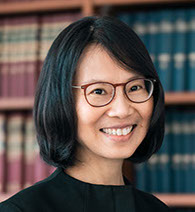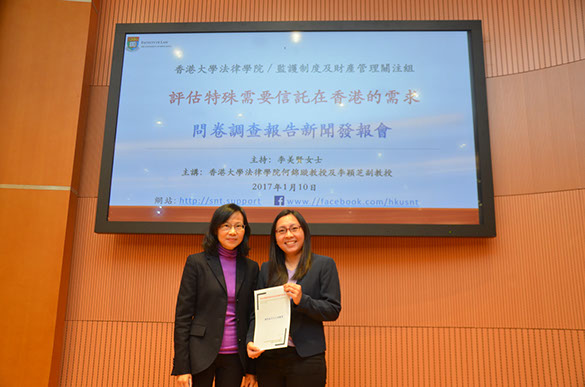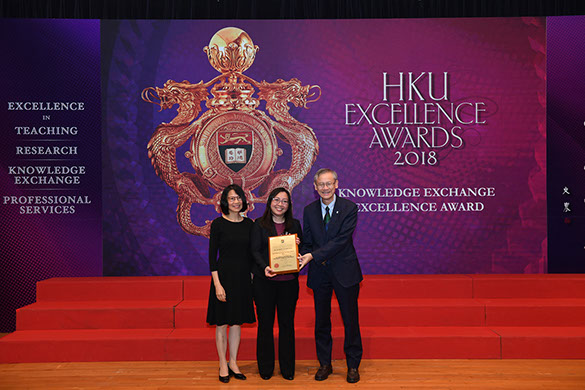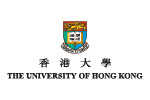LAW SCHOLARS PROVIDE INSPIRATION FOR SPECIAL NEEDS TRUST
Parents of special needs children have long worried about how to ensure the assets they bequeath to their children will be managed in their best interests. Now there is a solution thanks to the work of Professor Lusina Ho and Ms Rebecca Lee of the Faculty of Law: a government-managed Special Needs Trust.
The parents of more than 225,000 Hong Kong individuals with cognitive impairment have long faced a dilemma: after they pass away, who will manage the assets they leave their children in their children’s best interests? Their main option had been to set up a private trust, which typically requires a capital threshold of HK$40 million and annual fees of about HK$200,000 – well beyond the means of most families. But on December 28, 2018, the Hong Kong Government launched a Special Needs Trust (SNT) that is unique in the world because the Government is both the trustee and manager.
Parents can set up accounts today and the fees will not apply until after they pass away and payments start being made to their child’s designated caregiver. These fees are currently set at HK$1,750 per month.
The inspiration for the SNT came from two HKU law scholars, Professor Lusina Ho, Harold Hsiao-Wo Lee Professor in Trust and Equity, and Associate Professor Ms Rebecca Lee, who proposed the government-managed format after two NGOs approached them in 2015 about the feasibility of managing such a trust themselves. The two scholars, who had expertise in guardianship and enduring power of attorney, concluded that the NGOs could not afford to do this on their own.
“We crunched the numbers and found that it would not work without government participation. As a result, we wrote an informal paper to the Government that year and started discussing with them the idea that they establish and run the SNT,” Ms Lee said.

![]() Even Hong Kong Government officers have said it’s a perfect example of civil society working with academics and professionals on something that consolidates into government policy.
Even Hong Kong Government officers have said it’s a perfect example of civil society working with academics and professionals on something that consolidates into government policy. ![]()
Professor Lusina Ho
Rapid response
The idea received a welcome and rapid response. In January 2016 the Chief Executive’s Policy Address announced that a working group would be set up to explore the feasibility of setting up a public SNT and Professor Ho was among those appointed to the group. She provided expert input on such details as the market fee and the drafting of the trust deed.
Professor Ho and Ms Lee also surveyed parents on the need for an SNT and fed the results back to the Government. Working with the NGO, the Concern Group of Guardianship System and Financial Affairs, they questioned 2,500 parents of cognitively-impaired individuals about their preferences. The majority wanted a government-operated SNT that charged annual fees of no more than one per cent of the entrusted assets. The survey results were released in February 2017. Within a year of that date, the Government committed to set up the SNT and allocated HK$50 million towards it.
The SNT keeps administrative costs low by pooling the contributions of parents but segregating the amounts designated to each beneficiary, much like Hong Kong’s mandatory provident funds. The trusteeship is managed through the Department of Social Welfare, which also monitors caregivers appointed by parents. If no caregiver is appointed, it will also take up this role.
This arrangement is unique in the world, although Singapore has an SNT that is managed by an NGO and closely monitored by the government.
Leading the world
“People in other countries have told us how hard it is to convince their governments to do this and we feel really proud that we were able to convince the Hong Kong Government to listen to our proposal. Hong Kong is leading the world and showing that a government-managed SNT is feasible and affordable,” Professor Ho said.
The two scholars have also played an active role in explaining the SNT to the Hong Kong community. They delivered eight talks to NGOs that attracted nearly 1,800 participants in total, and Professor Ho participated in government outreach forums. They also trained students to deliver 23 talks to special schools and NGOs in the summer of 2018.
Overseas NGOs and experts have taken notice and have consulted the scholars on how to set up government-managed SNTs in their countries, with Korea leading the way. After Ms Lee presented their research to the Korean National Assembly in February 2018, NGOs there began to push for a similar scheme in their country and by September, the Korean Government announced it would establish a public SNT scheme.
“Our efforts have succeeded because we work in partnership with the special needs community. Even Hong Kong Government officers have said it’s a perfect example of civil society working with academics and professionals on something that consolidates into government policy. We provided the expertise and the Government responded to the needs of the community,” Professor Ho said.
The Hong Kong Government launched the Special Needs Trust in December 2018. This is unique in the world because the Government is both the trustee
and manager.


Professor Lusina Ho (left) and Associate Professor Ms Rebecca Lee (right) presented the survey report at the press conference in 2017.
Professor Ho (left) and Ms Lee (centre) being presented with the Knowledge Exchange Excellence Award 2018 for the winning knowledge exchange project titled ‘Introducing the Special Needs Trust to Hong Kong’.


Home
May 2019
Volume 20
No. 2

Knowledge Exchange
